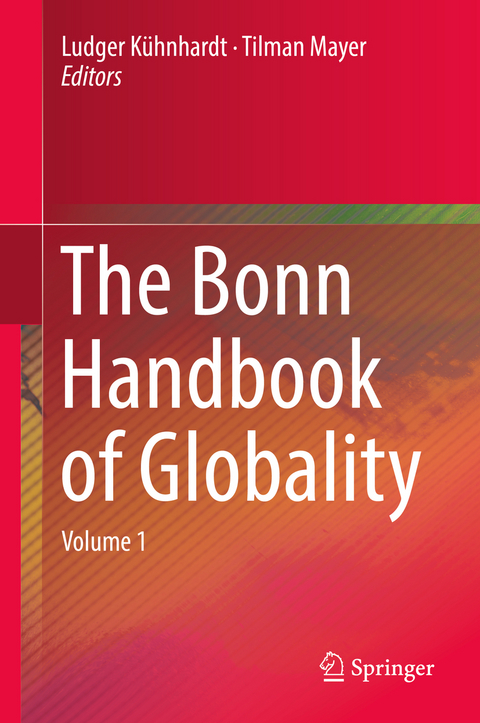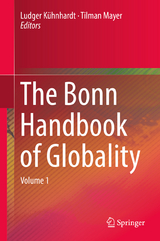The Bonn Handbook of Globality
Springer International Publishing (Verlag)
978-3-319-90376-7 (ISBN)
Volume 1 introduces readers to various interpretations of globality, and discusses notions of human development, communication and aesthetics.
Volume 2 covers notions of technical meaning, of political and moral order, and reflections on the shaping of globality.
Ludger Kühnhardt is a professor of Political Science at Bonn University, Germany. He is also director of Bonn University's Center for European Studies (ZEI).
Tilman Mayer is a professor of Political Science at Bonn University, Germany. He is also president of the Society for German Studies and a former president of the German Demographic Society (2010-2016).
I. Understanding Globality.- Introduction (Ludger Kühnhardt and Tilman Mayer).- Globality: Concept and impact (Ludger Kühnhardt).- Methods of intellectual concept formation (Volker Ladenthin).- The world of worlds (Markus Gabriel).- Nomos Earth (Wolfram Hogrebe).- Globality: Models for interpreting history (Günther Schulz).- II. Human Development: Freedom and Education.- Body (Ulrich Eibach).- Brain and Mind (Ulrich Ettinger).- Clothing (Volker Ladenthin).- Competence (Una M. Röhr-Sendlmeier and Udo Käser).- Demography (Hans-Dieter Laux).- Education and Formation (Reinhold Boschki).- Emotions (Rainer Banse and Jasmin Khosravie).- Family (Una M. Röhr-Sendlmeier).- Friendship (Dorothee Gall).- Gender (Sabine Sielke and Elisabeth Schäfer-Wünsche).- Happiness (Christoph Horn).- Health and medicine (Karoline Noack).- Intelligence (André Beauducel).- Knowledge (Elke Brendel).- Life phases (Georg Rudinger).- Nutrition (Joachim von Braun).- Reading (Florian Radvan).- Sexuality (Jasmin Khosravie and Rainer Banse).- Sports (Dittmar Dahlmann).- Subjectivity (Theo Kobusch).- III. Human Communication: Language and Interaction.- Argumentation (Elke Brendel).- Book (Günter Bader).- Collective identity (Christoph Antweiler).- Critique (Michael N. Forster).- English (Klaus P. Schneider and Uwe Baumann).- German (Claudia Wich-Reif).- Graphism(s) (Sabine Mainberger).- Internet (Caja Thimm).- Knowledge transfer (Uwe Küchler).- Languages (Franz Lebsanft).- Manners (Doris Mathilde Lucke).- Media (Michael Wetzel).- Nonverbal Communication (Mechthild Albert).- Reason and rationality (Rainer Stuhlmann-Laeisz).- Remembrance (Reinhold Boschki).- Symbolic signs (Ludwig D. Morenz).- Transfer of concepts (Harald Meyer).- Translation (Daniela Pirazzini).- World society (Rudolf Stichweh).- Writing (Ludwig D. Morenz).- IV: Technical-Instrumental Appropriation of the World: Property and Work.- Architecture (Georg Satzinger).- Border (Peter Schwieger).- Development (Erich Weede).- Division of labor (Friedrich Fürstenberg).- Environment (Jürgen Pohl).- Habitation (Jörg Blasius).- Home (Manfred Groten).- Intellectual property (Matthias Leistner and Stefan Koroch).- Landscape (Winfried Schenk).- Mobility (Dittmar Dahlmann).- Modernity (Ingo Stöckmann).- Nature (Karl Heinz Erdmann and Andreas W. Mues).- Progress (Dirk Tänzler).- Social Security (Friedrich Fürstenberg).- Space (Conrad Schetter).- Urban development (Theo Kötter).- Urban society (JörgBlasius).- Wealth (Winfried Schmitz).- Work (Gerhard Blickle and Mareike Kholin).- World Market (Ralph Kauz).
| Erscheinungsdatum | 09.09.2018 |
|---|---|
| Zusatzinfo | XXIII, 759 p. 13 illus., 7 illus. in color. |
| Verlagsort | Cham |
| Sprache | englisch |
| Maße | 155 x 235 mm |
| Gewicht | 1334 g |
| Themenwelt | Sozialwissenschaften ► Politik / Verwaltung ► Vergleichende Politikwissenschaften |
| Sozialwissenschaften ► Soziologie | |
| Schlagworte | globality • Globalization • global turn • Human Development • Modernity • Universalization |
| ISBN-10 | 3-319-90376-4 / 3319903764 |
| ISBN-13 | 978-3-319-90376-7 / 9783319903767 |
| Zustand | Neuware |
| Haben Sie eine Frage zum Produkt? |
aus dem Bereich




